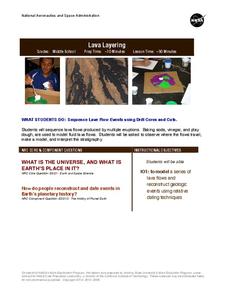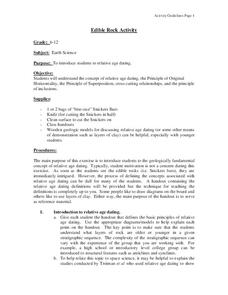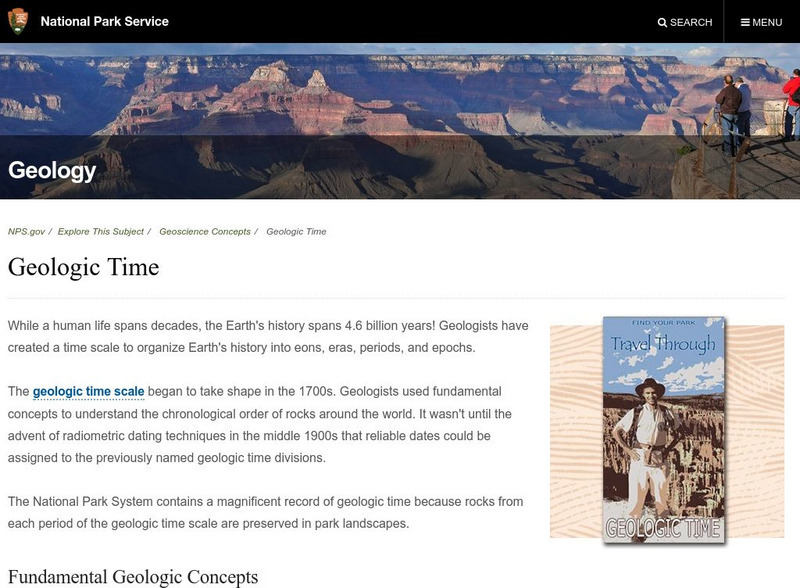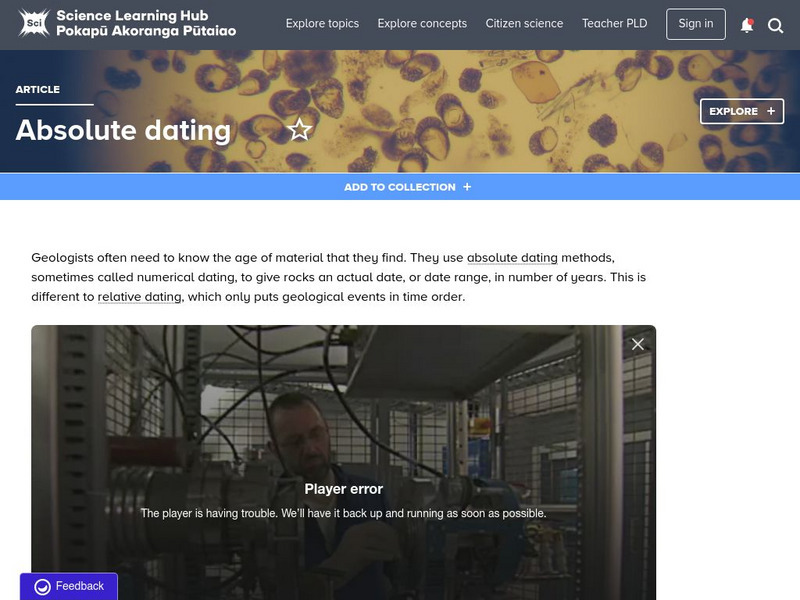Pace University
Grades 9-12 Earth Science
How has Earth changed over time? Pupils explore the topic in a differentiated instruction unit on the geological time scale. After a pre-assessment to gauge knowledge, class members divide into groups based on their ability levels and...
Curated OER
Relative Age Dating
Modeling dough and paper cutouts in science class? Learn about how relative age dating concepts, like the Law of Superposition and cross-cutting relationships, can be used to describe the formation of sedimentary layers.
NASA
Lava Layering
Take the old baking soda and vinegar volcano to the next level by using it to study repeated lava flows over time, examine geologic features on Earth and Mars, and speculate about some of the formations on Mars.
Curated OER
AP: Chapter 25: Phylogeny and Systematics
As a review or note taking guide, this resource wraps up a unit on the tree of life. Biology bigwigs define phylogeny and answer questions about the subsequent classification of organisms. The worksheet takes a straightforward and...
Curated OER
Edible Rock Activity
Who knew Snickers® could be used to teach science? Give your budding earth scientists a chance to explore the Law of Superposition, in addition to a well-earned snack.
Curated OER
Who Was Here First? Relative Dating
Students read about and complete question activities for the topic of relative dating. For this relative dating lesson, students read information for the topic and then complete two activities to further their understanding of geologic...
Curated OER
The History of Life
In this Earth's history worksheet, students will complete 5 true or false questions based on the early history of the Earth. Students will match 7 fossil vocabulary words to their definitions. Students will complete 4 short answer...
Curated OER
Relative Dating - Telling Time Using Fossils
Students use fossil range charts to explain relative dating. They graph for ammonites, marine organisms that went extinct at the same time as dinosaurs.
Curated OER
Relative Ages of Rocks
In this rocks worksheet, students review how sediments are layered over time and how the relative ages of rocks are determined. This worksheet has 1 matching and 11 multiple choice questions.
University of California
Ucmp: A Relative Dating Activity
An learning activity to help students grasp the concept of relative dating and geologic time.
Science Education Resource Center at Carleton College
Serc: Relative Dating of Geologic Materials
A detailed set of exercises (downloadable) that guide students in developing an understanding of how scientists have created the geologic time scale.
Science Education Resource Center at Carleton College
Serc: Hotspot Lesson: Relative Dating
This lesson explains the application of relative dating for volcanic features in the ocean, after which students will identify which volcanic features are relatively older than others.
Smithsonian Institution
National Museum of Natural History: Paleobiology: Absolute Dating
An explanation of radiometric or absolute dating of geological formations based on using the half-life of radioactive elements to figure out how old given rock layers are. A link on the left provides information about relative dating as...
Science Education Resource Center at Carleton College
Serc: Layer Cake Geology
Using a cake analogy, this activity teaches concepts such as: geologic time, rock layers, fossils, Law of Superposition, and relative dating. Activity can be modified to grade level and appropriate content for students,
Curated OER
National Park Service: What Is Geologic Time?
A discussion of geologic time, along with a presentation of evidence for the time span involved.
Other
University of Waikato: Science Learning Hub: Absolute Dating
Explains what absolute dating is as compared to relative dating and how they can work together. The characteristics of several different radiometric methods are compared. Includes three short videos and an interactive where students...
Other
Planetary Society: Relative and Absolute Ages in Histories of Earth and the Moon
A lengthy scholarly article that discusses the geologic time scale, its history of development, age-dating events that occurred in different eras, and how absolute and relative dating are used to assess the ages of the Earth and Moon....
Curated OER
National Park Service: Grand Canyon Geology
Extensive information about the geology of the Grand Canyon. Looks at some principles of geology evident there, forces that have shaped its geological features, how its valleys and canyons were formed, the characteristics of the Colorado...
Other
Milton J. Rubenstein Museum: Determining the Age of Rocks and Fossils [Pdf]
This set of activities from the Milton J. Rubenstein Museum of Science & Technology has students investigating how relative dating and absolute dating methods are used to determine the age of rocks and fossils.
Other
Western Oregon University: Earth System Science: Geologic Time [Pdf]
An 81-page slideshow that looks at the principles of geology with respect to relative dating, at different concepts describing geological processes, at absolute age and radiometric dating, at the eons and eras in the geologic time scale,...
Utah Education Network
Uen: Fossil Inferences
Arrange fossil pictures in sequence from oldest to youngest.
Utah State Office of Education
Utah Science: Rocks & Minerals
A unit on rocks and minerals presented with interactive and classroom activities. Gain understanding of rocks, weather, erosion, earthquakes, and relative dating with this resource.
Smithsonian Institution
National Museum of Natural History: Relative Dating in Archaeology [Pdf]
Activities for the classroom that teach about stratigraphy and seriation, two methods used in the relative dating of objects in archaeology.
Science Education Resource Center at Carleton College
Serc: Radioactive Dating: Looking at Half Lives Using M&ms
In this activity, learners gain a better understanding of radioactive dating and half-lives by using M&Ms to demonstrate the idea of radioactive decay. They will be able to see how scientists can determine the age of rocks by looking...





















